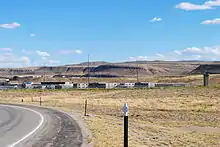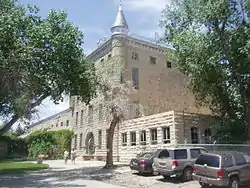Wyoming State Penitentiary
The Wyoming State Penitentiary is a historic and current prison in Rawlins, Carbon County, Wyoming, which has operated from 1901. It moved within Rawlins to a new location in 1981. In 2018, it is a Wyoming Department of Corrections state maximum-security prison for men.[1]
 | |

| |
| Location | 2900 S Higley Blvd, Rawlins, Wyoming |
|---|---|
| Status | In Use |
| Security class | Level IV/Level V Maximum Security |
| Capacity | 750 inmates |
| Opened | Frontier Prison: 1901 North Facility: 1980 Current facility: 2001 |
| Closed | Frontier Prison: 1980 North Facility: 2001 |
| Managed by | Wyoming Department of Corrections |
| Director | Michael Pacheco, Warden |
Wyoming State Penitentiary is also the location of the state's death row and execution chamber, which is located in the prison's parole board meeting room. No death sentences have been carried out in Wyoming since the 1992 execution of convicted murderer Mark Hopkinson, and, in 2018, there were no inmates on death row.
History
The penitentiary opened in Rawlins in 1901.
Wyoming State Penitentiary District | |
 The 1901 "Wyoming Frontier Prison" at 500 W. Walnut Street | |
| Location | 6th and Walnut Sts., Rawlins, Wyoming |
|---|---|
| Area | 30 acres (12 ha) |
| Built | 1894 |
| Architectural style | Mission/spanish Revival, Romanesque |
| NRHP reference No. | 83003360[2] |
| Added to NRHP | May 26, 1983 |
Wyoming State Penitentiary District, at 6th and Walnut Streets in Rawlins, Wyoming, is a historic district that was listed on the National Register of Historic Places in 1983. The listing included 14 contributing buildings.[2]
The listing included the original Administration Building, which is a large stone structure designed by Salt Lake City architect Walter E. Ware and built in stages during the 1890s. The design is generally Romanesque in style, including in its type of stonework and features such as a semicircular arch, vermiculated stone sills, short columns with foliated capitals, and cone-shaped roofs on its tower.[3]
It was completed in 1901. The 1901 building is now a museum called the Wyoming Frontier Prison.[4] Visitors can go on guided tours through the old prison. There are exhibits about the old and current prisons and the Wyoming Peace Officers' Museum.
The Ware-designed prison operated for 80 years. Convict Henry Ruhl was executed there in 1945, the only person executed by the U.S. Federal Government in Wyoming. This facility closed as a prison in 1981 when replaced by the current location.
Modern
Its current complex which opened in 1980 at first housed about 500 medium-security prisoners. The original portion of the complex, now called the North Facility, closed in 2001 as the newer South Facility opened. The South Facility boasts the third generation prison layout of 'pods.' A driving factor behind this was the faults with the star, or block, layout of the North Facility. Narrow halls and blind, sharp corners caused dangers to staff. Security issues of the old North Facility came to light when Corporal Wayne Martinez was killed by three inmates. The three inmates gained access to the control center Corporal Martinez was in, beating him with a fire extinguisher and stabbing him over thirty times. Two inmates involved in the attack were given life without the possibility of parole, while the third was sentenced to death. In memory of Corporal Martinez, the Wayne Martinez Training Center was given his name. The North Facility remains standing, but abandoned.[1]
Prior to 1991 the Wyoming Board of Charities and Reform operated the prison. After, the Wyoming Department of Corrections operated it.
Notable Inmates
- Russell Henderson and Aaron McKinney (later transferred due to overcrowding) - murderers of Matthew Shepard
- Diazem Hossencofft - confessed murderer of Girly Chew Hossencofft
- James Wiley - murdered his step-mother, along with his three step-brothers.[5]
Previous Wyoming territorial and state prison
Wyoming's first state prison, built in 1872 near Laramie, Wyoming and decommissioned in 1901, is now the Wyoming Territorial Prison State Historic Site. It operated as a federal penitentiary from 1872 to 1890, and as a state prison from 1890 to 1901.
References
- "Wyoming State Penitentiary". Wyoming Department of Corrections. Retrieved 7 August 2018.
- "National Register Information System". National Register of Historic Places. National Park Service. November 2, 2013.
- Wyoming Recreation Commission Staff (1983). "National Register of Historic Places Inventory/Nomination: Wyoming State Penitentiary". National Park Service. Retrieved May 24, 2019. With accompanying 17 photos from c.1900, 1978, and 1982
- "The Wyoming Frontier Prison". The Wyoming Frontier Prison. Retrieved 7 August 2018.
- https://www.wyodaily.com/story/2019/06/27/news/convicted-murderers-attempt-to-shorten-sentence-dismissed/9238.html
External links
- Wyoming State Penitentiary
- Wyoming Frontier Prison
- Wyoming Peace Officer's Museum
- Wyoming state Penitentiary at the Wyoming State Historic Presevation Office